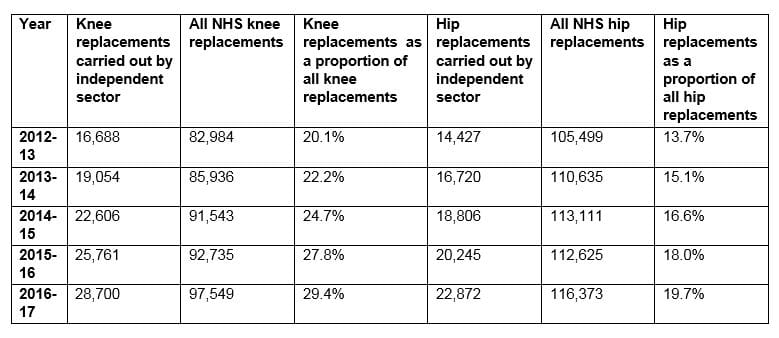Almost one in three NHS-funded knee replacements were undertaken in the independent sector last year
22 Sep 2018
Almost one in three (29.4%) NHS-funded knee replacements were carried out by the independent sector in 2016-2017, according to NHS Digital data published in response to a parliamentary health question tabled by former health minister, Lord Hunt. Almost one in five (19.7%) NHS-funded hip replacements were also carried out in the independent sector last year.
The proportion of NHS hip and knee replacements operations taking place in the independent sector has been rising steadily for the last five years. There were 28,700 knee replacements undertaken in the independent sector in 2016-2017 compared to 16,688 operations in 2012-2013, when the number made up 20.1% of all NHS knee replacements. Similarly, there were 22, 872 hip replacements completed by the independent sector in 2017-2017, compared to 14,427 in 2012-2013 (13.7% of all NHS hip replacements).
In total 51,572 hip and knee operations were completed by the independent sector during 2016-17.
Professor Derek Alderson, President of the Royal College of Surgeons, said:
“Faced with growing demand for services and unacceptably long waiting lists, the NHS is increasingly looking to the independent sector to relieve some of the pressure. This is especially true in hospitals where there aren’t enough free beds to allow planned surgery to go ahead. Private hospitals provide much-needed extra capacity, particularly for routine operations such as hip and knee replacements.
“Although the Royal College of Surgeons recognises the need to use the independent sector to enable patients to be treated more quickly in the short term, it does risk drawing resources, for example nursing staff, away from the NHS in the long term.
“We are also concerned that the transfer of planned hip and knee operations from NHS providers to the independent sector has had a negative impact on surgical trainees, many of whom cannot currently access training opportunities in the independent sector. Last winter the RCS had to issue advice to trainees who were at risk of not undertaking sufficient numbers of operations to fulfil their training requirements, due in part to the independent sector picking up the slack.
“Health Education England need to urgently look at how orthopaedic trainees in particular can access training opportunities in the independent sector given almost a third of knee operations are now done there.
“Ultimately, we would like to see the NHS grow to meet patient demand. The Government’s long term plan for the NHS must focus on creating the capacity that is needed, including beds, whether that be by building new wards, reopening wards that have been mothballed or ensuring there are enough staff to work on wards.
“Social care will also need to be properly resourced to reduce problems discharging patients who are ready to leave hospital, but have nowhere to go, and to ensure that older patients are treated appropriately at home or in community care, so that they don’t end up in hospital.”
Notes to editors
1. A count of finished consultant episodes (FCEs) with a main or secondary procedure of knee replacement and hip replacement where treatment was carried out by the independent sector, and the proportion these represent of all NHS knee and hip replacements, 2012-13 to 2016-17. Source: Hospital Episode Statistics, NHS Digital.
2. A FCE is a continuous period of admitted patient care under one consultant within one healthcare provider. FCEs are counted against the year in which they end. Figures do not represent the number of different patients, as a person may have more than one episode of care within the same stay in hospital or in different stays in the same year.
3. The Royal College of Surgeons of England is a professional membership organisation and registered charity, which exists to advance surgical standards and improve patient care.
4. For more information, please contact the RCS Press Office: telephone: 020 7869 6047/6041; e-mail: pressoffice@rcseng.ac.uk; for out of hours media enquiries: 07966 486832

